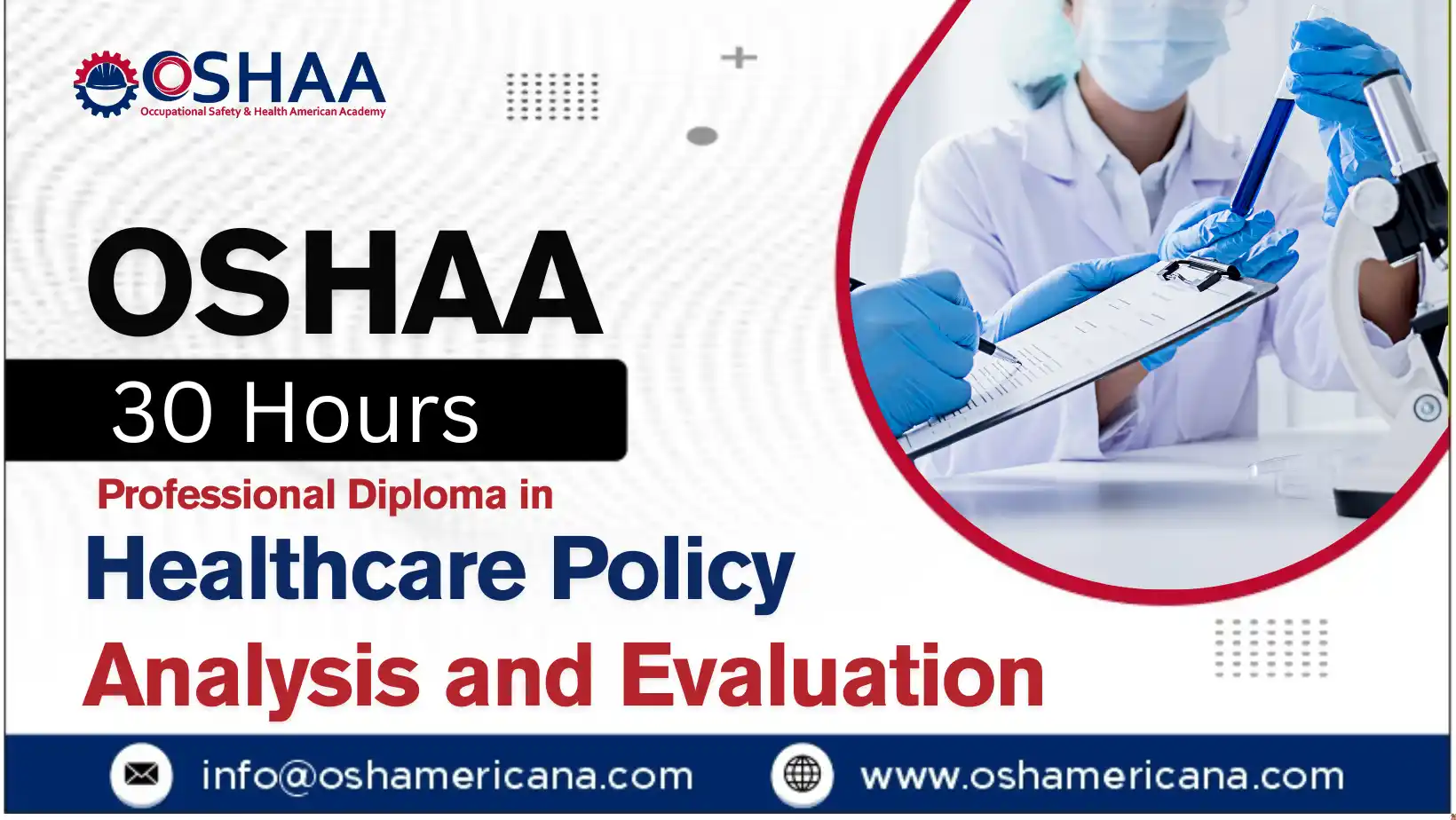The OSHAA 30-Hours Diploma in Healthcare Policy Analysis and Evaluation offers a focused and practical introduction to the critical skills required for understanding, analysing, and evaluating healthcare policies. Designed for professionals working within health systems, public health, or related sectors, this diploma equips participants with the tools necessary to assess policy impacts, inform decision-making, and contribute to the development of effective healthcare strategies.
Participants will engage with key concepts such as policy formulation, implementation challenges, cost-benefit analysis, and health outcomes measurement. The course also explores the influence of political, economic, and social factors on healthcare decision-making. Through a combination of theoretical knowledge and case study reviews, participants develop an informed perspective on how policies affect clinical practice, public health initiatives, and community wellbeing.
The OSHAA 30-Hours Diploma in Healthcare Policy Analysis and Evaluation is aligned with UK professional standards and is suitable for healthcare practitioners, public health workers, policy advisors, and researchers seeking to enhance their analytical capabilities. The diploma supports professional development and equips participants to play an active role in shaping and improving health policies at local, regional, and national levels.
Completing this diploma enables participants to confidently analyse healthcare policies, evaluate their effectiveness, and communicate findings to stakeholders. These skills are vital for advancing healthcare quality, promoting equitable access, and ensuring sustainable health systems. The course also provides a pathway for further study in health policy, management, or public health disciplines.
OSHAA 30-Hours Diploma in Healthcare Policy Analysis and Evaluation
Study Units
Learning Outcomes
Introduction to Healthcare Policy and Systems (3 Hours)
- Understand the structure and function of healthcare systems in the UK
- Define key concepts and terminology related to healthcare policy
- Recognise the roles of various stakeholders in healthcare delivery and policy-making
Policy Formulation and Development Processes (4 Hours)
- Explain the stages of healthcare policy formulation and development
- Identify factors influencing policy decisions at local and national levels
- Analyse the roles of government, organisations, and interest groups in policy creation
Analytical Frameworks for Policy Evaluation (6 Hours)
- Apply different frameworks and models used for policy analysis and evaluation
- Assess policy effectiveness using qualitative and quantitative approaches
- Develop critical thinking skills to interpret policy impacts on health outcomes
Health Economics and Cost-Benefit Analysis (4 Hours)
- Understand basic principles of health economics relevant to policy decisions
- Conduct cost-benefit and cost-effectiveness analyses for healthcare interventions
- Evaluate resource allocation and economic implications of policy options
Data Collection and Research Methods in Policy Analysis (4 Hours)
- Identify appropriate data sources and research methods for policy evaluation
- Design data collection strategies to support robust policy analysis
- Interpret research findings to inform evidence-based policy recommendations
Implementation Challenges and Stakeholder Engagement (3 Hours)
- Recognise common barriers to effective policy implementation
- Explore strategies to engage stakeholders and manage conflicting interests
- Develop skills for facilitating collaboration among diverse healthcare actors
Measuring Health Outcomes and Performance Indicators (4 Hours)
- Define key health outcomes and performance indicators used in policy evaluation
- Use metrics to monitor and assess the impact of healthcare policies
- Interpret data to guide improvements in service delivery and population health
Ethical and Legal Considerations in Healthcare Policy (2 Hours)
- Understand ethical principles guiding healthcare policy-making
- Identify legal requirements and constraints affecting policy development
- Address ethical dilemmas encountered during policy analysis and implementation
Course Benefits of the OSHAA 30-Hours Diploma in Healthcare Policy Analysis and Evaluation
- Equips participants with essential skills to critically analyse and evaluate healthcare policies
- Enhances understanding of healthcare systems, policy formulation, and implementation processes within the UK context
- Develops proficiency in using analytical frameworks and research methods for evidence-based policy assessment
- Provides practical knowledge of health economics to inform cost-effective decision-making
- Strengthens ability to measure health outcomes and performance indicators to improve healthcare quality
- Improves skills in stakeholder engagement and managing challenges in policy implementation
- Builds awareness of ethical and legal considerations relevant to healthcare policy
- Supports career advancement in health administration, public health, policy advisory, and related fields
- Enables participants to contribute effectively to policy development, monitoring, and evaluation efforts
- Offers a recognised professional qualification that enhances credibility and opens opportunities for further study
The OSHAA 30-Hours Diploma in Healthcare Policy Analysis and Evaluation is designed for participants who wish to deepen their understanding of healthcare policy and its impact on health systems. It is particularly suitable for:
- Healthcare professionals involved in policy development, planning, or management
- Public health practitioners seeking to enhance their policy analysis skills
- Policy advisors, analysts, and researchers working in healthcare or government organisations
- Managers and administrators aiming to improve decision-making through evidence-based policy evaluation
- Individuals pursuing careers in health services management, consultancy, or advocacy
- Participants interested in advancing their knowledge of health economics, legal, and ethical issues in policy
- Anyone committed to contributing to the improvement of healthcare delivery and population health through informed policy work
This course is ideal for those who want to play an active role in shaping and evaluating healthcare policies at local, regional, or national levels.







